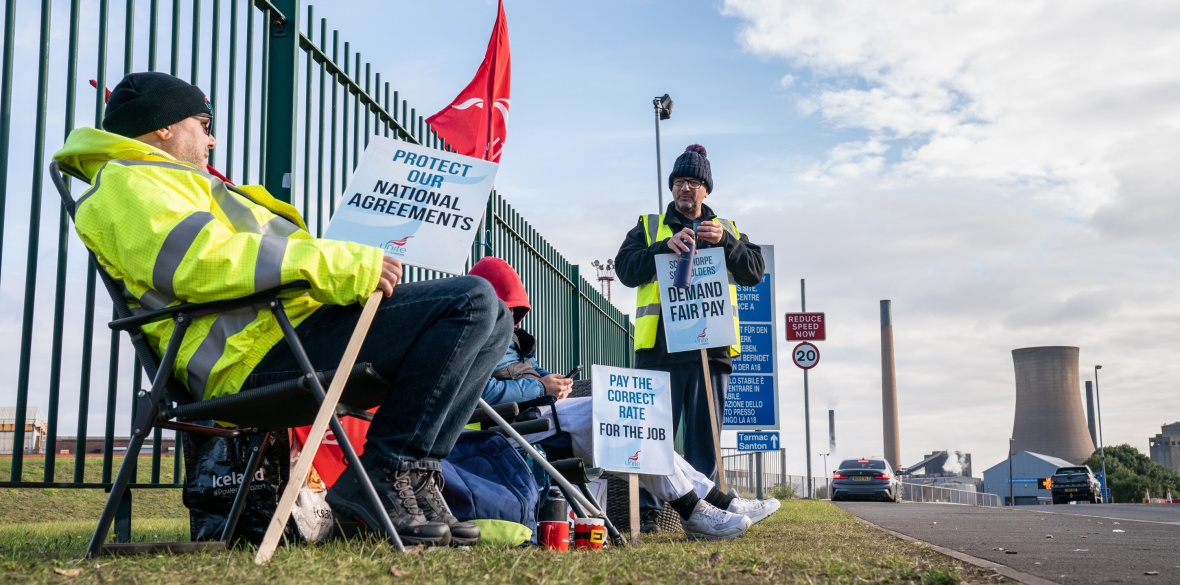This is the last article you can read this month
You can read more article this month
You can read more articles this month
Sorry your limit is up for this month
Reset on:
Please help support the Morning Star by subscribing here
AS READERS will know this dreadful Bill is back in the House of Lords today. Most of its 290 pages have been debated. Few improvements have so far been achieved. Today, it is the attack on the freedom to protest which is up for debate.
This obviously concerns everyone who believes that freedom to protest peacefully is a fundamental aspect of democracy. I want to draw the attention of trade unionists to the vicious attack in the Bill directed at them.
Let’s leave aside the introduction of a new statutory offence of public nuisance with a maximum sentence of 10 years in prison. And ignore the new offence of “attaching” oneself (by glue, by clasping hands? — the word is undefined). Let’s not mention the new police right to stop and search someone without having any reason. Let’s focus on the right to picket.
The right to picket to peacefully persuade people not to work in an industrial dispute has been a statutory right since 1875. It has been much restricted, most recently by the Trade Union Act 2016. But, though emaciated, this vital right remains.
The Bill will cut down that right. This is how. A senior police officer will have the power to impose conditions on “assemblies” (even of one person) and marches where the officer reasonably believes that noise generated by persons taking part may result in “serious disruption to the life of the community” or “serious disruption to the activities of an organisation which are carried on in the vicinity.” It will be a criminal offence to breach such conditions.
Note that the key is “noise.” Pickets are not normally particularly noisy but they are certainly far from silent. The use of a loudhailer, chanting, singing, shouting “scab,” using vuvuzelas, having a Scottish piper, even making a speech might tip the balance.
And the very purpose of a picket is to cause “disruption to the activities of an organisation which are carried on in the vicinity,” namely the employer.
It really cannot be left to a police officer to decide whether noise, rather than the mere presence of the pickets with their placards, “may result” in “disruption.” Neither should it be left to the police to decide whether such disruption is “serious” — as no doubt the employer will be urging.
The Bill did not define either “serious disruption to the life of the community” or “serious disruption to the activities of an organisation.” After criticism by a Lords Committee, the government seeks to amend the Bill by adding definitions. These new definitions give the game away.
The amendment states that “serious disruption to the life of the community” may include (but is not limited to) two situations.
The first is where the noisy gathering may result in a significant delay to the supply of a time-sensitive product to consumers of that product. A “time-sensitive product” is defined as a product whose value or use to consumers may be significantly reduced by a delay in supply.
Secondly, where it may result in prolonged physical disruption to access to essential goods or any service including, in particular, access to the supply of money, food, water, energy, fuel, a system of communications, a transport facility, an educational institution, or a service related to health.
The word “prolonged” is not defined and is left to the discretion of the police.
The range of industries is remarkable. Workplaces involved in food, water, power and fuel supply; road, rail, waterway and maritime transport; newspaper, mail, TV, radio, film, telephony and electronic communications; education, health and any other time-sensitive product or service. Industrial picketing is at risk in almost every sector of the economy.
As to “serious disruption to the activities of an organisation which are carried on in the vicinity,” the amendment includes where “the noisy gathering may result in persons connected with the organisation not being reasonably able, for a prolonged period of time, to carry on” those activities. Effective picketing is in the cross-hairs.
And if the police officer concludes that a noisy picket is causing serious disruption as described, conditions may be imposed. These too are undefined but may obviously include limiting the number of pickets below the six stipulated by the Code of Practice — perhaps down to one, or perhaps a condition of near silence.
I and others in the Lords will be moving our own amendments to seek to exclude these provisions from the Bill. We will be up against it. Trade unionists beware.










